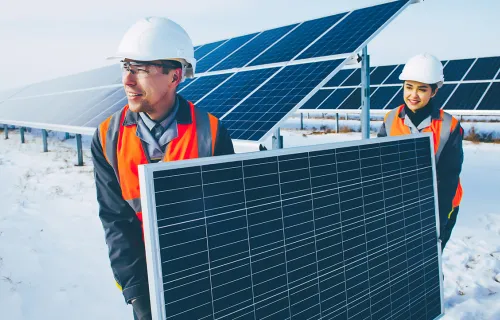The European Union (EU) aims to become carbon neutral by 2050. This means pushing the envelope to find new and smarter ways to achieve this challenging climate change target. Are local energy communities the answer?
The current energy system is demand led and is a centralized top-down system—essentially one-way traffic from production to consumption. This means energy is supplied from a central point of production and generation to cities, factories and homes via the grid.
The fast-approaching future looks very different. It’s a future that revolves around consumers that both consume and produce electricity—the so called “prosumer.” Together with growing renewable energy sources and the rapid adoption of electric vehicles, the transition to a prosumer-led, low-carbon society requires a new energy system, one that ensures the network is not overloaded and can manage the demand and supply of energy. One new system being explored in the Netherlands is CGI’s digital energy island platform.
Creating a self-sustaining energy ecosystem
If it’s possible to buy electricity from a large utility, why can’t you buy the surplus electricity that your neighbor generates from his solar panels? The advantage: consumption meets production at a local level and creates new market and business models, such as peer-to-peer trading. As a result, prosumers can receive a fair price for the energy they are producing. In fact, in the 2018 CGI Client Global Insights, 76% of the executives we interviewed cite changing business and operating models to address distributed energy resources as a top trend, a notable increase from 45% in 2017.
Now imagine expanding the idea of trading energy with a neighbor to other individuals within a district, town or even the entire city. The city of Groningen in the Netherlands is doing just that! Recently named a 'Lighthouse' city by the European Commission (EC), Groningen is using the digital energy island platform to create a local distributed energy system.
Through a smart city approach and innovative solutions—such as extracting biogas from kitchen waste and engaging in projects focused on the smarter use of heat networks and vertical solar panels—the platform aims to make entire districts energy-neutral or even energy-positive. Residents play an important role in this model as they actively exchange their energy with their neighbors or a company located close by.
An open innovation platform
CGI has developed an open innovation platform that forms the bedrock of the digital energy island platform. In Groningen, the platform brings all data sources including weather, central market systems, smart meters, external devices such as street lights, smart buildings, etc., onto one single integrated platform. Data is collected, stored and shared with the participants, including the residents, building owners and housing cooperatives. Consumers can compare their energy usage and production with their neighbors through gamification, while ecosystem players are provided with data analysis, insights and validation of their innovations.
The energy island concept seeks to shorten the traditionally large production-to-consumption chain and make electricity cheaper for the end consumer. For instance, in the Netherlands, electricity costs €0.22/Kwh; when self-produced, it could come down to as low as €0.15/Kwh. That’s a potential saving of almost €230 per year, per household.
A place for everyone
To build a new sustainable and reliable energy system, collaboration is key. Our conversations with utilities executives as part of the 2018 CGI Client Global Insights reveal that embracing collaborative business models that extend beyond the boundaries of the organization are key to creating and delivering enhanced value to customers. The Groningen project involves 34 parties, and by creating a platform that enables all these parties to share information, it encourages more participation including from councils, energy corporations, energy suppliers, distribution system operators (DSO), etc.
Together with a second “Lighthouse” city, Oulu in Finland, Groningen is part of 'Making-City', a project under the EC-subsidized H2020 Smart Cities and Communities program. León (Spain), Bassano del Grappa (Italy), Kadiköy (Turkey), Poprad (Slovakia), Vidin (Bulgaria) and Lublin (Poland) are also part of the program, with more cities to follow.
It’s clear that the potential of digital energy islands is enormous; cities and countries around the world just need to roll up their sleeves and get started. Through collaborative innovation and digital technologies, CGI enables energy ecosystems to ensure a sustainable, reliable, secure and affordable energy future.





